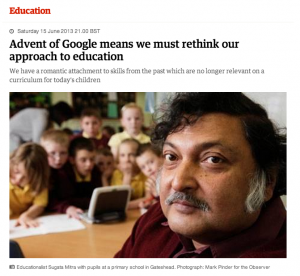curriculum expectations extensive reading language courses Language learning school management self-study TED
by sendaiben
2 comments
New Educational Paradigms
Sugata Mitra’s article in the Guardian on Saturday was very interesting. If you have seen his TED talks (and they are well worth watching), you will know the kind of educational changes he is looking to make.
What struck me is how similar it is to what my collaborator Daniel E. and I are trying to do at Tohoku University. There is a common thread running through our reading, discussion, presentation, and computer classes. We call it ‘practical’, ‘industrial’, or ‘student-focused’ English. To be honest, we haven’t found the perfect descriptor yet 😉
All of the classes are built on the following principles:
1. content and participation are student-generated
2. the bulk of the teacher’s work happens outside the classroom in planning and preparation
3. teachers have a coaching rather than instructional role
4. students are active and spend most of their time using English in pairs or small groups
5. teachers have high expectations regarding student achievement
We’ve mainly been talking about extensive reading so far, but there are plans afoot for a guide to leading discussion classes, with online study and presentation to follow after that. For now, you can catch us at the Extensive Reading World Congress in Seoul in September, or at JALT National in Kobe in October.
Or, you know, leave a comment here if you like!
Oxford Teachers’ Academy
Oxford Teachers’ Academy (OTA) is a teacher training program jointly administered by Oxford University Press and the University of Oxford. Courses normally last three days and there are a number of topic areas. The content of the courses is developed in the UK and delivered by local or international trainers.
OTA has now come to Japan and I’m incredibly excited and honored to be involved in the first course, to be held in Tokyo next month. All the details are here.
The course will be run on a long weekend, from July 13-15 on the Principles of Teaching Young Learners.
conference extensive reading graded readers Language learning presentations Reading
by sendaiben
4 comments
Readability (and the lack of it) in graded readers
At the JALT Pan-SIG conference a few weeks ago (my favourite conference in Japan) I attended two extremely thought-provoking lectures, back to back. Both of them were talking about something very similar, something that has also been coming up in conversations with students this week.
The topic was readability of graded readers, or why some books are easier to read than others.
Marcos Benevides has a great blog post outlining the content of his talk. It’s well worth taking a few minutes to read that now.
Amanda Gillis-Furutaka, from Kyoto Sangyo University, talked about her fascinating research into the specific problems students have when reading English text. Her findings were echoed by my students when I talked to them about their reading in extensive reading classes this week. If you have the chance to attend one of her presentations on this topic at JALT or elsewhere, please consider doing so.
So what makes books difficult for students (focusing on students reading texts up to around 1000 headwords, ie beginner to lower-intermediate readers)? In short, the following:
-number of characters (the more characters the harder it is to understand the story)
-the complexity of the language (modal verbs and allegory are a real barrier to understanding)
-literary devices such as changing between different perspectives, changing from the present to the past suddenly, or unexpected plot twists
While these insights are perhaps most useful to authors and publishers, they can also help teachers recommend books for students (and know which books to put off until later!). Really interesting stuff, and I’m looking forward to reading Ms Gillis-Furutaka’s research when she publishes it.
expectations high school presentations public policy testing TOEFL
by sendaiben
6 comments
More on the TOEFL test
I attended a very comprehensive workshop on the TOEFL test yesterday, conducted by Ron Campbell and organized by MEESA (Miyagi English Education Support Association).
I came away with a much better idea of what the TOEFL iBT is, and what it isn’t. I had been under the impression that it was an adaptive test (ie the questions changed based on whether you got the previous question right or wrong) but this is not the case.
Apparently the TOEFL will be part of the civil service examinations from 2015, which is very interesting.
I also learned that the government is planning to make all public school English teachers take the TOEFL. I think this is a good idea, as it will hopefully motivate less proficient teachers to work on their language skills. I have always been surprised at how little time and effort many English teachers put into their own language study. This is a big contrast to the language teachers I know in the UK.
However, after learning about the structure of the test and doing some practice exercises, I am more convinced than ever that using the test in its current form to test all high school students is an awful idea. It is simply way too hard and focuses on academic English, an area most students who are not planning to study abroad do not need to prioritize.
I am planning to take the TOEFL myself at some point in order to understand it better, but the very high cost is a stumbling block.
You can see my previous post on using TOEFL for university entrance selection here.


